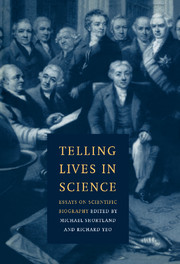Book contents
- Frontmatter
- Contents
- List of contributors
- Preface
- Introduction
- 1 Existential projects and existential choice in science: science biography as an edifying genre
- 2 Life-paths: autobiography, science and the French Revolution
- 3 From science to wisdom: Humphry Davy's life
- 4 Robert Boyle and the dilemma of biography in the age of the Scientific Revolution
- 5 Alphabetical lives: scientific biography in historical dictionaries and encyclopaedias
- 6 The scientist as hero: public images of Michael Faraday
- 7 ‘Tactful organising and executive power’: biographies of Florence Nightingale for girls
- 8 Taking histories, medical lives: Thomas Beddoes and biography
- 9 The scientist as patron and patriotic symbol: the changing reputation of Sir Joseph Banks
- 10 Metabiographical reflections on Charles Darwin
- Index
3 - From science to wisdom: Humphry Davy's life
Published online by Cambridge University Press: 28 October 2009
- Frontmatter
- Contents
- List of contributors
- Preface
- Introduction
- 1 Existential projects and existential choice in science: science biography as an edifying genre
- 2 Life-paths: autobiography, science and the French Revolution
- 3 From science to wisdom: Humphry Davy's life
- 4 Robert Boyle and the dilemma of biography in the age of the Scientific Revolution
- 5 Alphabetical lives: scientific biography in historical dictionaries and encyclopaedias
- 6 The scientist as hero: public images of Michael Faraday
- 7 ‘Tactful organising and executive power’: biographies of Florence Nightingale for girls
- 8 Taking histories, medical lives: Thomas Beddoes and biography
- 9 The scientist as patron and patriotic symbol: the changing reputation of Sir Joseph Banks
- 10 Metabiographical reflections on Charles Darwin
- Index
Summary
Creative science is a game for the young. Those excel in it who retain a childlike curiosity about the world down to an age when most of their contemporaries have got interested in other things like sex, power and money. While politicians, historians and playwrights (whose jobs depend upon understanding people) improve like claret with age, scientists may go off. Those engaged in scientific biography, therefore, face in particularly acute form the problem of dealing with a drama which comes to a climax early on, and then tails off. This makes for a poor read.
Davy's work on laughing gas was done when he was twenty-one; his electrochemical researches led to his discovery of potassium when he was twenty-nine; by his middle thirties he had elucidated the nature of chlorine, and invented the safety lamp for coal miners. If we concentrate upon his life in science as a matter of making discoveries which are still of importance in our own day, then his later life will have little interest for us. This is the approach in Harold Hartley's biography, which is excellent when dealing with the scientific discoveries but where Davy's later years are briefly dismissed. At forty-one, in 1820, he was elected President of the Royal Society; in early retirement from 1827 he wrote dialogues about fishing and then about life in general; and he died abroad, at Geneva, in 1829 after travelling in fruitless search of health.
- Type
- Chapter
- Information
- Telling Lives in ScienceEssays on Scientific Biography, pp. 103 - 114Publisher: Cambridge University PressPrint publication year: 1996



